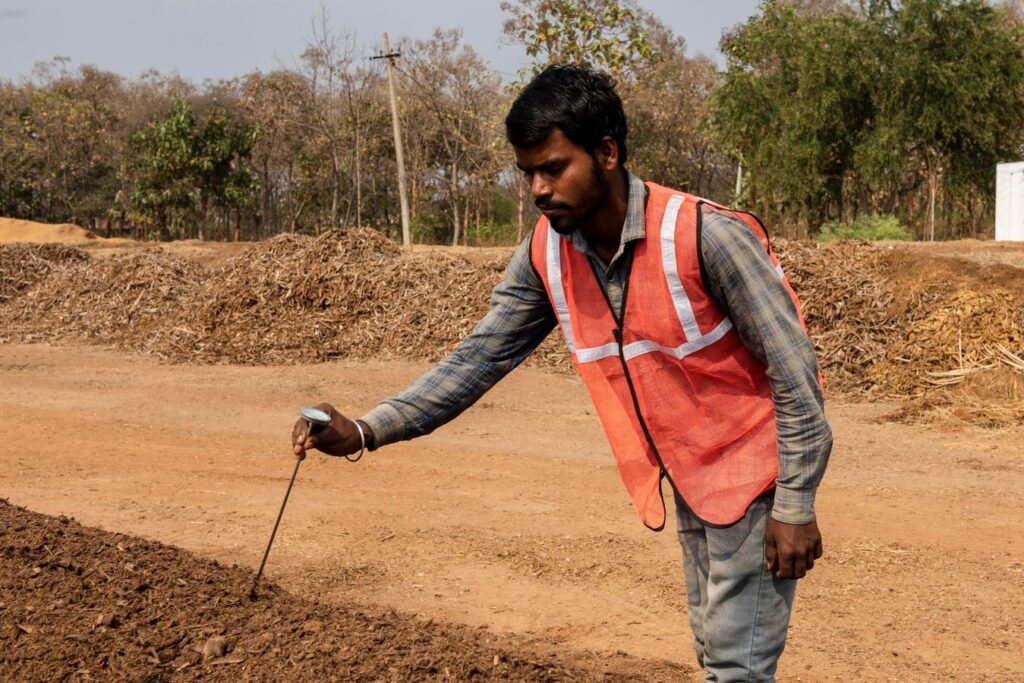India may be famous for tea, but in the Araku region, researchers, an NGO and indigenous farmer organisations are working to produce coffee and restoring soils.
Araku is a hilly region in the Eastern Ghats of Andhra Pradesh in India, where coffee cultivation has been an economic driver for indigenous communities.
Dr Pushpajeet L Choudhari, is a soil scientist at the International Crops Research Institute for the Semi-Arid Tropics is a principal Investigator of a partnership between ICRISAT and Indian NGO Naandi Foundation.
“The adoption of regenerative practices and agri-inputs has led to higher cupping scores, (higher quality and taste profiles of roasted coffee), allowing Araku coffee to become an international premium brand,” he says, “This has translated to higher incomes for the farmers, which has lifted entire communities out of poverty.”
Choudhari explains that they are studying the impact of long term usage of regenerative soil nutrients and amendments by continuously monitoring soil health and their impact on yield.
The researchers supervised the collection, testing, and analyses of 12,000 soil and compost samples from Araku; quality-tested compost as a critical regenerative agriculture input produced in Araku and developed a soil and plant sampling handbook in both English and Telugu.
David Hogg, chief regenerative agriculture advisor for the Naandi Foundation explains that proliferating soil microbiota protects crops from harmful pathogens like aflatoxins, rusts and fusarium.
“Prioritizing soil and crop quality and farmer equity at each step of the agricultural value chain in this manner is the essence of ‘Arakunomics’ and a climate change solution for transforming arable landscapes into carbon productive ecosystems, he says.
In 2024, the foundation’s work was recently recognized as one of two winners of the Seeding The Future Grand Prize, receiving $250,000 in grant funding from the Institute of Food Technologists and Seeding The Future Foundation.
Farming In The Araku Region
Thamarbha Chittibabu, a farmer in the Araku region and current president of the 30,000-family-strong Small and Marginal Tribal Farmers Mutually Aided Cooperative Society, explains that in the recent past, farmers in Araku did not get fair prices for their produce.
“Collaboration has helped farmers overcome exploitation by middlemen, thereby improving their incomes and livelihoods,” he says, adding that he joined the cooperative because it offered competitive market prices for the coffee he grew, but he also got access to knowledge and training on regenerative agriculture.
Chittibabu explains that the project helped farmers produce coffee and other crops through regenerative agriculture practices, without chemical inputs appeals to the consumer as well with growing demand for organic produce.
“I believe this model can be replicated across the country and it can help gradually change the mindset of farmers and consumers across the world towards a more ecologically and economically conscious form of agriculture,” he says, adding that the presence of a dedicated body like SAMTFMACS provides farmers with a platform to approach and discuss their needs and requirements on a regular basis.
Climate Smart Agriculture in Bangladesh
Elsewhere in the region, Asif Ishtiaque, an assistant professor at Missouri State University, originally from Bangladesh has been looking at farms in South Asia to determine why agricultural practices aimed at reducing carbon emissions haven’t been adopted.
Ishtiaque explains says that climate-smart agriculture is a suite of agricultural practices and technologies designed to address the challenges posed by climate change in the agricultural sector, while also promoting sustainability and resilience.
“I observed majority of the farmers are not adopting most climate-smart agriculture practices and technologies, even technologies were highly recommended by government and non-government agricultural organizations,” he says.
Despite the promise of climate-smart agriculture (CSA) to improve food security in South Asia, most CSA practices and technologies have not been widely adopted.
“Previous studies on the adoption of climate-smart agriculture practices and technologies were mostly case-study focused and limited to a specific location, whereas it was important to view this problem as a regional issue,” he says, adding that large-scale interventions may not be possible if studies are conducted on a case-by-case basis.
Read the full article here














